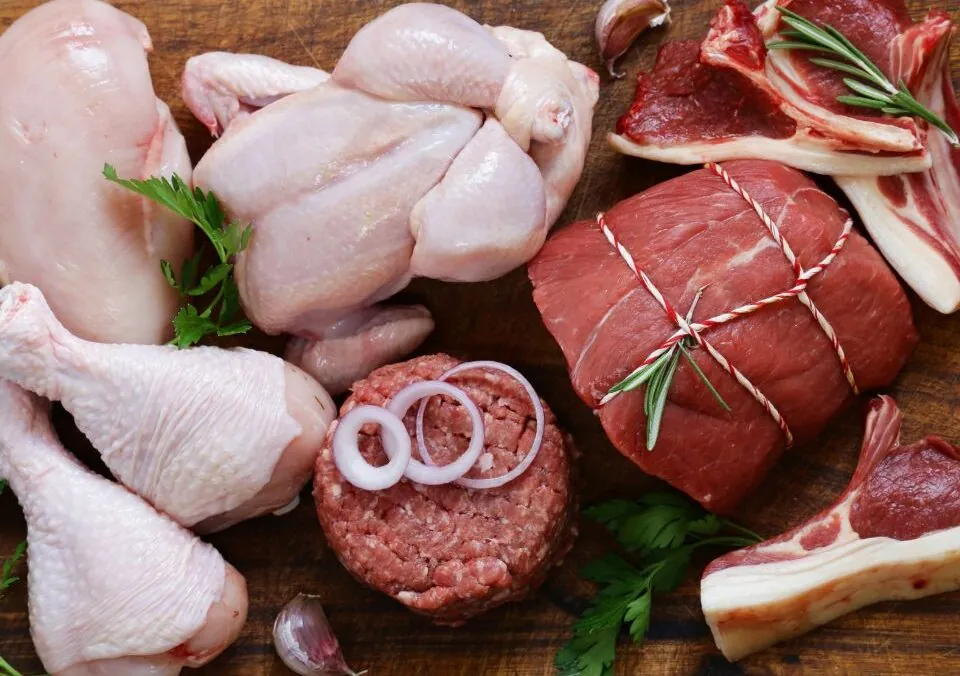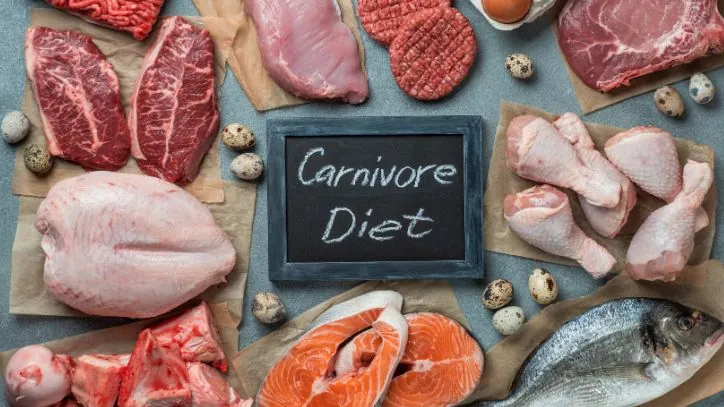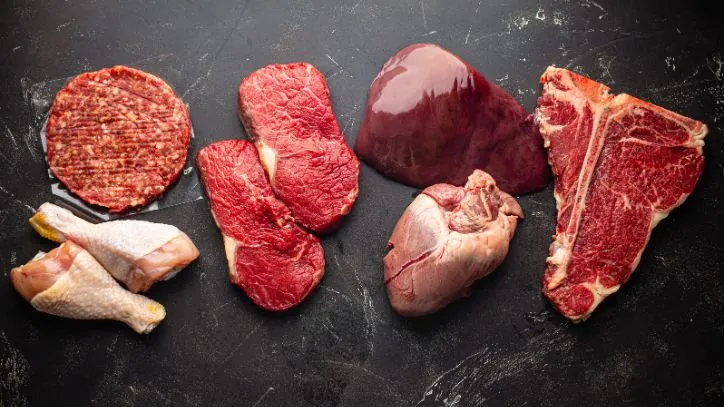Blog
Exploring the Carnivore Diet: A Meat-Lover’s Paradise or Nutritional Mirage?

I think I’d be happy just eating meat. When I discovered the carnivore diet, I became intrigued and decided to learn more about it. The carnivore diet has emerged as a polarizing topic in the ever-evolving world of dietary trends. Advocates hail it as a return to ancestral eating habits, while critics warn of potential health risks. Let’s examine this all-meat regimen and its implications.
The popularity of this diet took off a few years ago when podcaster Joe Rogan discussed it during his podcast. His influence, combined with testimonials from various dieters, has led to a surge of interest in this unconventional approach to nutrition.
What is the Carnivore Diet?
The carnivore diet is straightforward: it restricts the dieter to consume only animal products. This means a menu rich in beef, pork, poultry, fish, eggs, and, for some, dairy. All plant-based foods—fruits, vegetables, grains, legumes, nuts, and seeds—are off-limits. This makes the carnivore diet a zero-carb, high-protein, and high-fat regime.
Simplicity is a hallmark of this diet. There’s no calorie counting or complex meal prep involved; you eat meat to your heart’s content, making it appealing for those looking for a clear-cut dietary plan.
Why Some Swear by It
Supporters of the carnivore diet claim numerous benefits, including:
1. Weight Loss: Many report significant weight loss attributed to the high protein and fat intake. High protein diets can promote feelings of satiety, meaning individuals may consume fewer calories overall.
2. Simplified Eating: With limited food choices, meal planning can become more straightforward and less stressful. The need to make decisions about what to eat is removed, allowing for more routine.
3. Autoimmune Relief: Some individuals have claimed to experience relief from autoimmune symptoms, positing that eliminating certain plant foods may lead to reduced inflammation and improved symptoms.
Notable figures like Joe Rogan have publicly experimented with the diet, sharing both the positive and challenging aspects. For those looking for community and support, many online forums and social media groups have sprung up, where people share their experiences and results from following the carnivore diet.
Potential Health Risks
However, dietitians and health experts caution against the carnivore diet, highlighting several potential risks that come with its restrictive nature. According to experts, eliminating plant-based foods can lead to deficiencies in essential nutrients such as fiber, vitamin C, and phytonutrients—nutrients that play crucial roles in gut health and immune function.
The diet’s heavy reliance on animal fats and proteins may increase the risk of cardiovascular disease, inflammation, and long-term metabolic imbalances. A more balanced approach, which includes a variety of food sources, is recommended by dietitians to support overall health.

Here are some specific health concerns associated with the carnivore diet:
1. Nutrient Deficiencies: A diet limited to animal products can lack essential nutrients commonly found in plant foods. For instance, vitamin C is essential for immune function and collagen formation; without it, individuals may risk scurvy over time. Fiber, found only in plant foods, is crucial for digestive health; its absence can lead to constipation and other digestive discomforts.
2. Digestive Issues: The absence of fiber can lead to complications in digestive health, with many people reporting gastrointestinal issues as a common side effect. Some users have noted instances of constipation and discomfort due to the lack of diverse food intake.
3. Long-Term Health Risks: The rigidity of the carnivore diet raises concerns regarding its long-term feasibility. A case study published highlighted a 68-year-old man who developed kidney stones after adopting the carnivore diet, suggesting potential renal complications. Such adverse effects raise questions about the diet’s safety over extended periods.
A Zero-Carb Approach
Unlike more lenient diets, such as the ketogenic diet, which allows some low-carb vegetables and aims to keep the body in ketosis, the carnivore diet is entirely carb-free, barring trace amounts found in eggs and dairy. This approach forces the body to rely almost exclusively on fat for energy, which can lead to both positive and negative experiences.
1. Increased Ketone Production: The transition to fat metabolism leads to a rise in ketone production. Some individuals report cognitive benefits and increased mental clarity as the body adapts to using fats as the primary fuel source.
2. Energy Fluctuations: However, this shift can also lead to what some refer to as the “carnivore flu,” a phase characterized by fatigue, headaches, and malaise as the body adjusts to the absence of carbohydrates.
3. Improved Insulin Sensitivity: Interestingly, some dieters claim improved blood sugar regulation and reduced inflammation since carbohydrates are eliminated entirely, leading to stabilized blood sugar levels without the spikes typically caused by high-carb meals.
Psychological Aspects of the Diet
The psychological aspect of adopting any restrictive diet should not be overlooked. The carnivore diet advocates for a radical departure from conventional eating habits, which can affect one’s mental well-being. Many dieters experience an initial “high” from the simplicity and perceived benefits of their new regime, but as time goes on, the monotony may lead to feelings of boredom or deprivation.
Social situations can also become more complicated. Sharing meals can be challenging when adhering to such strict dietary rules, which can lead to feelings of isolation or anxiety around food. Some individuals find themselves missing out on shared experiences because of their adherence to the diet.

The Nutritional Debate
The nutritional landscape is continuously evolving, and diets are often subject to heated discussions among experts. On one side, proponents argue that a return to ancestral eating habits is essential for optimal health, while on the other side, nutritionists stress the importance of variety and nutrient diversity in a balanced diet.
Critics point out that many of the claims made by carnivore diet supporters lack solid scientific backing. Although anecdotal evidence can be compelling, it is crucial to look for peer-reviewed studies and empirical data to make informed dietary choices.
Currently, there have not been any long-term peer-reviewed studies on the carnivore diet. Thus, the specific outcomes of long-term adherence remain largely undocumented and speculative. Individual experiences vary widely, and what works for one person may not work for another. Therefore, it’s important to approach any major dietary change with caution and consultation from healthcare professionals.
Making the Choice: Is the Carnivore Diet Right for You?
Deciding whether or not to embark on the carnivore diet is a deeply personal choice and should be influenced by individual health needs, dietary preferences, and lifestyle. Here are a few considerations to keep in mind:
1. Individual Health Conditions: If you have pre-existing health conditions, especially those related to the heart, kidney, or digestive health, consulting a healthcare provider is crucial before making drastic dietary changes.
2. Nutritional Needs: Evaluate your lifestyle and nutritional requirements. Are you getting enough variety in your food intake? Are you meeting your macro- and micronutrient needs?
3. Experimentation and Flexibility: Some people find success in experimenting with their diets. It may be beneficial to try the carnivore diet for a limited time while closely monitoring how it affects your body, and be prepared to adjust your approach as needed.
4. Mental Wellness: Reflect on how dietary restrictions impact your mental health. Will this diet empower you, or will it lead to feelings of deprivation and anxiety around food?
A Personal Conclusion
In my personal conclusion, balance may be more beneficial than extreme restrictions in nutrition. While I genuinely enjoy both brisket and various forms of meat, I also have a deep appreciation for vegetables and their myriad of health benefits. A diverse diet not only provides essential nutrients but also enriches the eating experience with different flavors and textures.
Variety in food choices can enhance overall health and well-being, offering nutrients that support bodily functions in ways that an all-meat diet may not.
Final Thoughts
The carnivore diet is undeniably an intriguing concept, especially for meat lovers. Its simplicity and the potential for weight loss can be appealing; however, the long-term health risks and nutritional deficiencies are significant concerns that cannot be overlooked. Before diving into any restrictive diet, particularly one as extreme as the carnivore diet, it’s essential to conduct thorough research, seek professional guidance, and consider your personal health needs and preferences.
As with any dietary choice, the best approach is one that supports your health while allowing for enjoyment, balance, and variety. Remember that every person’s body reacts differently to dietary changes, so be sure to listen to your body as you navigate your dietary journey.
For those curious about exploring this diet further, resources such as nutritionists, dieticians, and online communities can provide valuable insights and support. Whether you’re considering the carnivore diet or simply looking to enhance your overall eating habits, the quest for a nutritious diet is ultimately a personal journey worth taking.
By Joel Carr Arizona Farm Bureau Strategic Communications Manager

















